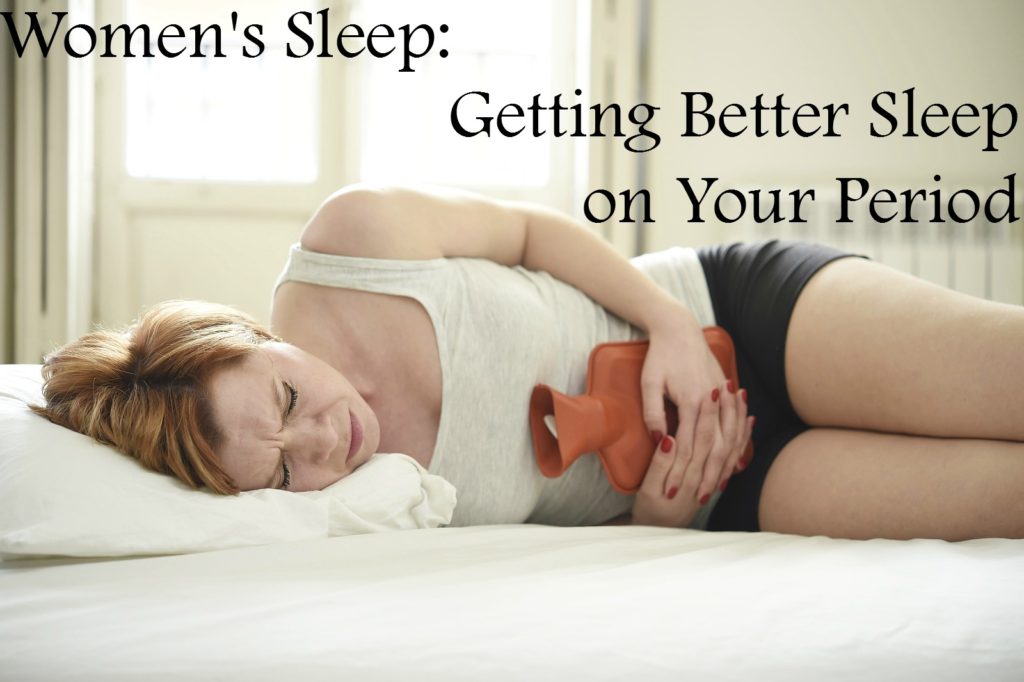According to research shared by the Huffington Post, hormonal changes can often be the culprit in lost sleep for women. Women have a more difficult time getting enough sleep at certain points in their menstrual cycles each month. Pregnant women also frequently lose sleep or suffer from insomnia as hormone levels surge during their pregnancy. Menopause can also bring about hot flashes and restlessness at night that prevent women from getting adequate or restful sleep. This is the first in a series of blogs that focus on the various conditions that affect women’s sleep, and what they can do to help ensure they get a better night’s rest.

How Does Your Period Affect Your Sleep?
Dr. Carmel Harrington, researcher and author of The Sleep Diet and The Complete Guide to a Good Night’s Sleep, states that the different stages of a woman’s cycle affect their sleep differently and that by understanding what is happening inside your body during the different phases, you will be able to take action to manage any negative effects your cycle may have on your sleep.
In the first phase of your cycle, before ovulation, your estrogen levels are at their highest. After ovulation, estrogen levels fall which causes your body temperature to rise slightly, by about 1°F. This rise in body temperature can make getting to sleep in the second half of their cycle more difficult for some women. It is at this time that progesterone (another hormone) levels begin to rise. Progesterone is soporific, which means it increases a woman’s need for sleep. If this extra need for sleep is ignored, you may become significantly sleep deprived at the end of your cycle. As a result, you will experience the adverse effects of sleep deprivation including lack of energy, decreased motivation, moodiness, and sometimes depression. All of which are the hallmark characteristics of PMS. When on your period things such as cramps, bloating, headaches, heavy bleeding, and pain can all lead to sleep problems as well.
7 Tips for Better Sleep on Your Period
The National Sleep Foundation found that 23 percent of women report disrupted sleep in the week before their periods, and a full 30 percent report disrupted sleep during them. Here are some tips on how to best handle your body changes each month, and get back to getting a good night’s sleep.
- Keep cool. One of the main biological triggers that make you feel sleepy is an evening drop in body temperature. When your body temperature rises during your cycle, this is disrupted and makes falling asleep more difficult. The National Sleep Foundation recommends your room temperature be set between 60 and 67°F. You could try and trick your body into sleepiness with a warm shower or bath. Moving from the warm water to your cool bedroom will make your body temperature drop. You could also try sleeping with fewer
- Recognize your need for extra sleep. With the increase in progesterone levels in the second phase of your cycle, you will need more sleep than normal. Try and get to bed 30-45 minutes earlier to improve premenstrual symptoms and to help keep you from feeling “foggy” or fatigued the following day.
- Relax before bedtime. Period related mood swings are normal and may make you experience negative emotions more strongly, and bring on bouts of anxiety and depression making it difficult to fall asleep. Breathing exercises, meditation, and yoga can help you to unwind and relax before bedtime.
- Avoid heavy meals close to bedtime. Digestive upsets such as bloating, diarrhea, indigestion, and nausea during menstruation can disrupt your sleep. If you need an evening snack, avoid the urge to eat ice cream or chocolate and opt for foods that can help you sleep like trail mix, toast, or plain rice.
- Treat your pain. For some women, periods = pain. Pain often presents itself in the form of cramps, headaches, and generalized muscle pain when menstruating. Untreated pain can make it difficult to sleep. Try adding or subtracting pillows, changing your sleep position, or using a heating pad to help relieve pressure. If the pain is really bad, take a mild painkiller like Tylenol or Midol. For the headaches, a small amount of caffeine can help, but you shouldn’t overdo it.
- Be prepared for heavy bleeding*. Worrying about leaks can make getting quality sleep on your period difficult. Keep “throw away” panties and sheets available for use when you are on your period. This way if a leak happens it’s not such a big deal. Wear the appropriate pads for your cycle. If you are really heavy, wear the supers. Some brands even have an overnight option which you may want to consider. Pads with wings are the best for sleep as the wings help keep your pad in place. Try sleeping in positions that keep your legs closed tightly to avoid moving the pad around. Sleeping in a tampon is not recommended, as wearing them for a prolonged amount of time could lead to toxic shock syndrome.
- Consider birth control. Hormonal birth control, like the pill and certain IUD’s help to decrease the fluctuation of estrogen and progesterone which are responsible for almost all period symptoms. So, taking one of these forms of contraception can help you to get better sleep.
If you find that you are regularly having trouble sleeping and feeling rested, then you may have a sleep disorder. You may benefit from an appointment at one of the Valley Sleep Center’s five convenient locations for a sleep consultation with one of our board-certified sleep physicians.
*If you are experiencing irregular periods or heavy bleeding, you may want to schedule an appointment with your gynecologist.
Related Articles:
- Sleep, Women, and Stress
- The Role of Sleep in Women’s Health
- 4 Tips to Help Women Get a Good Night Sleep
- Why Women Can’t Get a Good Night Sleep
- Why Women Have Difficulty Sleeping

